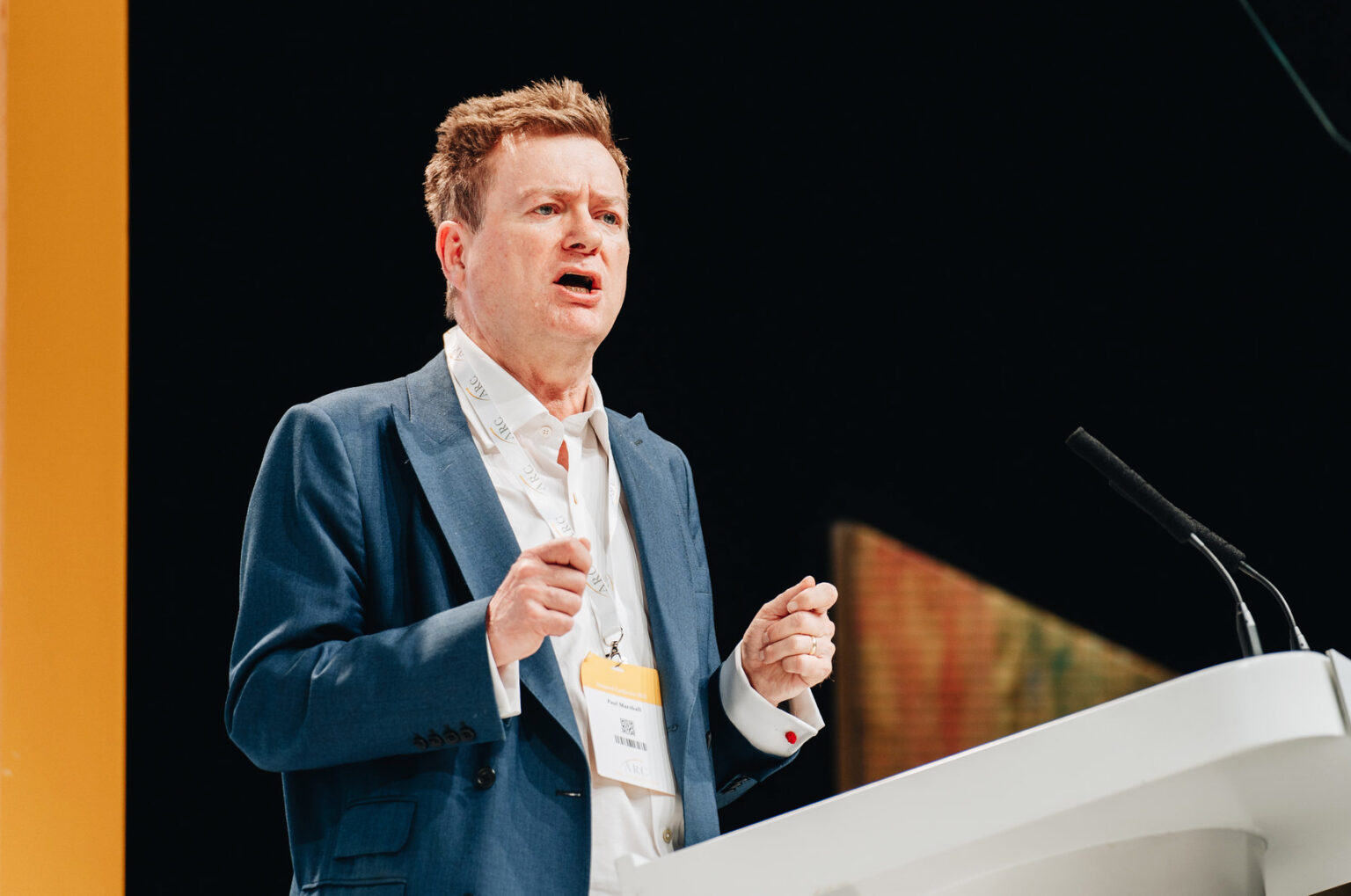The new owner of The Spectator magazine has close financial ties to a U.S. firm with major investments in oil, gas, and coal – including several projects dubbed “carbon bombs” by campaigners.
GB News co-owner Paul Marshall, who completed his purchase of The Spectator this week, is the chairman and chief investment officer of Marshall Wace, a hedge fund that he co-founded in 1997.
As revealed by DeSmog, Marshall Wace had £1.8 billion invested in fossil fuels firms – including oil and gas majors Chevron, Shell, and Equinor – as of June 2023.
DeSmog can also now report that one of the largest shareholders in Marshall’s hedge fund has extensive fossil fuel investments.
Subscribe to our newsletter
Stay up to date with DeSmog news and alerts
KKR, a U.S. private equity giant with more than $500 billion in assets under management, bought a 25 percent stake in Marshall Wace in 2015 and increased its share to 39.9 percent as of June 2023.
KKR’s investment “turbocharged” the hedge fund’s growth, according to the Financial Times, with Marshall Wace’s assets under management multiplying from £17 billion to £48 billion – transforming it into one of the world’s largest hedge funds.
Analysis by the investigative group Private Equity Climate Risks, published in April, suggests that KKR has a large fossil fuel portfolio, with 188 assets in 21 countries, including oil, gas, and coal.
Private Equity Climate Risks estimates that KKR is responsible for 93 million metric tons of carbon dioxide equivalent emissions a year, including 5.6 million metric tons from coal power.
KKR’s assets include oil and gas plants and pipelines across North America; coal power stations in France, Bulgaria, and Columbia; and biomass plants in France, Portugal, Australia, and Brazil.
The company’s estimated emissions are 6,500 times higher than KKR claims in its sustainability reports, according to Private Equity Climate Risks. The research group says that KKR’s sustainability reports exclude the emissions of the companies in its investment portfolio, dramatically reducing its stated climate impact.
KKR has disputed these figures, but has not provided alternate numbers. The private equity firm previously told the Financial Times: “A just energy transition will require massive investment in green energy and decarbonising high emitters. KKR is contributing to both, having deployed nearly $40 billion investing in renewables, energy efficiency and green energy distribution, and working with companies with high emissions… to develop net zero-aligned decarbonisation plans.”
In September 2022, Private Equity Climate Risks reported that 78 percent of KKR’s energy investments were in fossil fuels, including in 28 fossil fuel companies.
Both GB News and The Spectator frequently attack green policies, climate protestors, and climate science.
“KKR is actively funding polluting projects and the creation of new fossil infrastructure, despite clear scientific evidence and global agreements pointing to the need to phase out fossil fuels,” said Alyssa Moore, researcher at the data analysis group Global Energy Monitor.
KKR also previously provided sponsorship funding to the State Financial Officers Foundation, a U.S. organisation with close ties to climate science denial groups that has lobbied Republican state politicians to “promote oil and gas interests”.
Marshall Wace and KKR are “strategic partners” and, in June 2023, Marshall Wace hired KKR partner Todd Builione to run its North American business.
KKR, Marshall Wace, and The Spectator were approached for comment.
What is a hedge fund?
Hedge funds are investment vehicles that bet on rising and falling share prices.
What is a private equity firm?
Private equity firms buy and invest in companies with the aim of improving their financial performance and selling them for a profit.
Marshall’s Media Ventures
Marshall is the co-owner of GB News, a right-wing broadcaster launched in 2021 that regularly questions climate science and attacks green policies.
Marshall, estimated to be worth £800 million, reportedly invested £10 million in GB News when it first launched three years ago. In August 2022, he joined the Dubai-based investment firm Legatum Group in a £60 million capital injection and buyout of GB News’s other major investor, Discovery.
An investigation by DeSmog in May last year found that one in three GB News presenters – who include several Conservative and Reform UK politicians – had spread climate science denial on air in 2022, while more than half had attacked climate action. GB News presenters have used their platforms to urge the UK to “drill, baby, drill” for more coal, oil and gas.
In buying The Spectator, Marshall will be purchasing another media outlet that has been hostile to climate action.
The current issue of the magazine features a cover story by Ross Clark, a journalist who has a long record of questioning climate science, attacking the new Labour government’s clean energy policies.
This week, the magazine’s YouTube channel also published an interview on “climate alarmism” with Bjorn Lomborg, a Danish author who frequently downplays climate change.
Spectator columnist and its former editor Charles Moore is an ex-trustee of the Global Warming Policy Foundation (GWPF), the UK’s main climate denial group, while columnist Matt Ridley is a current GWPF advisor. GB News has given dozens of appearances to individuals associated with the GWPF.
The Spectator had an average print circulation of 98,000 in 2023, making it the fourth most read current affairs magazine in the UK. Marshall’s acquisition will increase his influence in the world of right-wing politics, with the financier expected to appoint a new Spectator board featuring Conservative politicians.
“Britain needs a media that tells the truth about climate change and serves the public interest, not those of fossil-fuelled billionaires,” Richard Wilson, director of the campaign group Stop Funding Heat, told DeSmog.
“The Spectator is already notorious for its divisive agenda, and misleading climate commentary. But GB News has proven to be even more extreme, with commentators promoting dangerous conspiracy theories, dismissing the climate crisis as a ‘hoax’.
“Many will now be disturbed to see oil and gas investors further extending their influence over our press.”
Marshall has also supported a number of other groups that are hostile to climate action. In 2023, Marshall gave £1 million via his charity, the Sequoia Trust, to the Alliance for Responsible Citizenship (ARC), a conservative lobby group that shares its directors with GB News. As DeSmog has reported, ARC has promoted climate science denial since its launch last year, and is fronted by Canadian author Jordan Peterson, who is a leading opponent of climate action.
Marshall also used the Sequoia Trust to give £890,000 to the right-wing think tank Policy Exchange between 2020 and 2023. The think tank – which has in the past received money from the oil and gas major ExxonMobil – was credited by former prime minister Rishi Sunak for helping to draft laws that have cracked down on climate protests.
An investigation by the anti-fascist charity HOPE not hate in February revealed that Marshall had liked or shared a number of social media posts containing far-right views, including one which said: “It is just a matter of time before civil war starts in Europe. The native European population is losing patience with the fake refugee invaders.”
The Spectator attacked the investigation, which was released in partnership with the News Agents podcast, calling it a “smear campaign” against Marshall.
Marshall is also still in the running to buy The Spectator’s sister publication, The Telegraph newspaper, which routinely questions climate science, denounces climate activists, and criticises green reforms.
Subscribe to our newsletter
Stay up to date with DeSmog news and alerts







